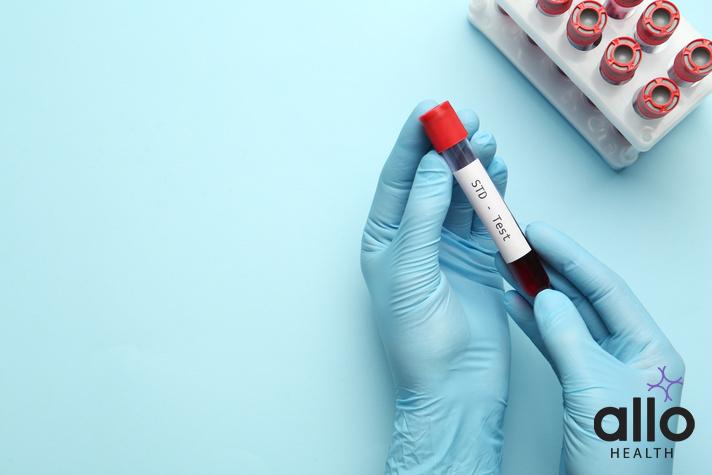What Are The Symptoms And Complications Of Mycoplasma Genitalium (MG)?

Allo Health is dedicated to personalized well-being, offering support and trusted information tailored to individual health goals. The platform emphasizes human-generated content, led by a distinguished medical team of experts, including physicians and sexual health specialists. Their commitment to credibility involves rigorous fact-checking, authoritative research, and continuous updates to ensure accurate, up-to-date information. Allo Health's unique approach goes beyond conventional platforms, providing expert-led insights and a continuous commitment to excellence, with user feedback playing a crucial role in shaping the platform's authoritative voice.

Dr Sanina Mansoor holds MBBS degree from Yenepoya university,Mangalore.She has 8 years of experience working as a medical officer at various health centres and medical colleges.
Why This Was Upated?
Our experts continually monitor the health and wellness space, and we update our articles when new information became available.
Updated on 26 February, 2025
- Article was updated as part of our commitment to diversity, equity, and inclusion.

"The following blog article provides general information and insights on various topics. However, it is important to note that the information presented is not intended as professional advice in any specific field or area. The content of this blog is for general educational and informational purposes only.
Book consultation
The content should not be interpreted as endorsement, recommendation, or guarantee of any product, service, or information mentioned. Readers are solely responsible for the decisions and actions they take based on the information provided in this blog. It is essential to exercise individual judgment, critical thinking, and personal responsibility when applying or implementing any information or suggestions discussed in the blog."
Mycoplasma genitalium (MG) is a type of bacteria that can infect the genital tract. It is considered a sexually transmitted infection (STI) and can cause various symptoms and complications. Understanding these symptoms and complications is crucial for early detection and appropriate treatment. Here’s an in-depth look at the symptoms and complications of Mycoplasma genitalium.
Symptoms Of Mycoplasma Genitalium
-
Symptoms In Men:
- Urethritis: Men with MG often experience inflammation of the urethra, leading to symptoms like pain or burning sensation during urination.
- Discharge: Thick or watery discharge from the penis, often white or clear, can be a common sign of MG infection.
- Painful Ejaculation: Some men may experience pain or discomfort during ejaculation, which can be attributed to MG infection.
- Inflammation: Inflammation of the reproductive organs, such as the epididymis (epididymitis), can occur in severe cases, leading to pain and swelling in the testicles.
-
Symptoms In Women:
- Vaginal Discharge: Women infected with MG may experience abnormal vaginal discharge, which can be white, greenish-yellow, or thin and watery.
- Pelvic Pain: Pain in the pelvic region, especially during intercourse or menstruation, is a common symptom of MG infection in women.
- Bleeding Between Periods: MG can cause irregular bleeding between menstrual periods, known as inter-menstrual bleeding, indicating an underlying infection.
- Painful Urination: Similar to men, women with MG may also experience pain or discomfort during urination due to urethritis.
Complications Of Mycoplasma Genitalium
-
Complications In Men:
- Prostatitis: MG infection can spread to the prostate gland, causing prostatitis characterised by pelvic pain, difficulty urinating, and sexual dysfunction.
- Recurrent Infections: Untreated MG infections can lead to recurrent urethritis and other complications, impacting overall reproductive health.
- Infertility:

In rare cases, persistent MG infections can contribute to infertility by affecting sperm quality and function.
-
Complications In Women:
- Pelvic Inflammatory Disease (PID): Untreated MG infections can lead to PID, a serious condition causing inflammation of the reproductive organs like the uterus, Fallopian tubes, and ovaries. PID can result in chronic pelvic pain, infertility, and ectopic pregnancies.
- Cervicitis: MG can cause inflammation of the cervix (cervicitis), leading to abnormal cervical discharge, pain during intercourse, and potential complications during pregnancy.
- Pregnancy Complications: Pregnant women with MG may face an increased risk of preterm birth, low birth weight, and potential transmission of the infection to the newborn during delivery.
Diagnosis And Treatment

Diagnosing MG often involves testing samples from the genital tract, such as urine, vaginal swabs, or urethral swabs. Molecular tests like polymerase chain reaction (PCR) are commonly used for accurate detection.
Treatment typically involves antibiotics, such as azithromycin or doxycycline. However, due to rising antibiotic resistance, healthcare providers may need to consider alternative antibiotics or combination therapies. It’s crucial to complete the full course of treatment as prescribed, even if symptoms improve, to reduce the risk of recurrent infections and complications.
Prevention
Preventing Mycoplasma genitalium infections and their complications involves practising safe sex, including consistent and correct use of condoms, limiting sexual partners, and seeking prompt medical attention if symptoms of an STI arise. Regular STI screenings, especially for individuals at higher risk, can also aid in early detection and treatment.
Mycoplasma genitalium can cause a range of symptoms in both men and women, from urethritis and cervicitis to more serious complications like PID and infertility. Early diagnosis, appropriate treatment, and preventive measures are essential for managing MG infections and reducing their impact on sexual health.








































